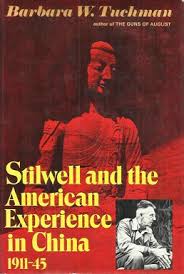SEPTEMBER 3, 2020 – If human affairs in this country seem to be spinning out of control, they’ve got nothing on China during most of the 20th century. I’m re-acquainting myself with China’s historical chaos, misery and outrages by way of a re-read of Barbara Tuchman’s Stilwell and the American Experience in China 1911 – 1945. Tuchman’s scholarship and brilliant writing put her on my list of favorite historians.
She presents General Stilwell as a highly intelligent and disciplined individual and a solidly “C” student: courageous, competent, and conscientious. He was also devoted to his wife and children. But he could be acerbic, hence his moniker, “Vinegar Joe,” and he didn’t suffer fools lightly.
As with any good historical biography, the book provides ample insight into the larger story—the stage on which the central character acted and the cast of numerous players, grand and cameo, with whom that main subject interacted.
Multiple threads are woven into a gripping historical fabric: the corrosive effects of Western meddling in China, pre-1911 and the consequence of China’s treatment at the post-WWI Paris Peace Conference; Japan’s sudden modernization and brutal imperialism; the grip of stuck-in-time Chinese cultural traditions; the Chinese soldier’s (peasant’s) ostensibly infinite capacity for privation and brutal suffering—under largely corrupt, myopic, and incompetent leadership; the fall of China’s emperor and the rise of regional warlords; the halting revolution spurred by Sun Yat-sen; the rise of Chinese Communism and its direction by Comintern; the Kuomitang and its split between right-wing factions consolidated by “G-mo”—Generalissimo Chiang Kai-Shek—and left-wing under Mao Zedong; American isolationism (pre-WWII) and ill-preparedness for global conflict; wartime friction between allies—America and Britain; how America was “played” by G-mo and his American-educated relatives.
Few officers, if any, in U.S. ranks knew China better than Stilwell. He learned the language fluently, and in his pre-WWII assignment as military attaché (information gatherer), Stilwell walked and slogged through countless miles of mud and misery alongside Chinese coolies, peasants, and conscripts, eating foul food and staying at rat-infested, vermin-patrolled “inns” along the way. His mastery of military strategy and tactics was also extraordinary—earning him the respect of General George C. Marshall.
But in the end, American policy in China was a failure. Too many dynamics worked against a outcome more favorable for China and the world. Imperial Japan went down in defeat, but so did tens of millions of Chinese in the 1930s and 1940s, and under the Red Star that rose in 1949 and burned mercilessly for decades thereafter.
Sadly, Stilwell himself died just a year after his mission in China ended.
What of China today? Its ascendancy is miraculous but so are its troubles imponderable. How this dichotomy—miraculous ascendancy/imponderable troubles—plays out will continue to affect profoundly the rest of the world. Amidst our current national obsessions, we should carve out time and attention to glance at the past, understand China’s path to this juncture, and prepare for the next chapter of its journey, which will be our journey too.
(Remember to subscribe to this blog and receive notifications of new posts by email.)
© 2020 by Eric Nilsson
